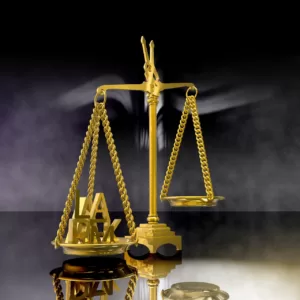Section 51 is based on the principle of equity that “one who seek equity must do equity” . This sections gives relief to a transferee who makes improvements in good faith on the land held by him and is being evicted subsequently by a person having better title.
Example : If A agree to sell his land to B and accordingly on the bases of entered agreement also gives possession of the land to B but for more value of land ultimately sell that land to C . Now if C having better title on the basis of the sale deed tries to evict B . B will be entitled to get the valuation or compensation for the improvements done by him in the immoveable property.
In another example
If a person purchases a land say , from an ostensible owner (benamidar ) believing that the vendor is the real owner and in good faith also constructs a building on the land then, it is obvious that the real owner may ask the purchaser to vacate the land on the ground of his better title. But since the conduct of the real owner , who now claims better title in land , is itself unjust and iniquitous because
- He had allowed the vender to sell the land
- He had allowed the purchaser to make improvements on the land
So equity may not help him in asserting his title. If he seems equity’s help in claiming his better title in the land and thereby evicting the purchaser , equity would require him to compensate the purchaser for the improvements made by him.
Provisions of section 51
Sections 51 provides that :-
- When the transferee of immoveable property
- Make any improvement on the property
- Believing in good faith that he is absolutely entitled thereto , and
- He is subsequently evicted therefrom by any person having better title ,
- The transferee has right to require the person causing eviction either :-
- To have the value of the improvement estimated and paid or secured to the transferee
- To sell the interest in the property to the transferee as it’s market value irrespective of the value of such improvement
- The amount to be paid or secured in respect of such improvement shall be the estimated value of it at the time of eviction
Essential conditions of section 51:
- Transferee of Immoveable Property
- Improvement made in Good Faith
- He is evicted from the land by a person having better title
Transferee of immoveable property
Transferee here means a person in whose favour a transfer deed has been executed after complying with all formalities. But would not cover in it stranger or trespasser nor an auction purchaser. The equity enacted in this section gives relief to the transferee of an immoveable property who believes himself to be absolutely entitled to make improvements.
In the following cases transferee has been given the benefit of this section
- Naryan vs. Basurayypa 1956 – Purchaser who purchased bonafide in ignorance of the mortgage .
- Nanjamma vs. Nacharmal 1907 -A purchaser of a life estate who believed that his vendor was absolutely entitled .
- Harilal vs. Gordhan -Where the transferee had purchased a Minor’s property from de facto guardian believing that the guardian was authorised to sell the property.
- Natesa vs. District Board of Tanjore 1926 – A purchaser who was put in possession of a larger area and who made improvements on excess land under a mistaken belief that he was entitled to do so.
- Topanmal vs. Chanchalmal1940 -A transferee under an oral sale of immoveable property worth Rs.100 or more.
These are some examples where a person who made improvements on the property has been regarded as transferee for the purpose of this section.
In the following cases the transferee cannot be given the benefit of this section :-
Lessee:- A lessee cannot be regarded as ‘transferee’ under this section and as such he cannot claim compensation for any improvements made by him. There is no reason that a lessee should believe that he is absolutely entitled to the property held by him even if he is permanent lessee .
Mortgage :- A mortgage is also not a person who could believe that he is absolutely entitled to the property mortgaged to him.
Trespasser :- A trespasser can never be regarded as transferee , therefore he cannot claim compensation for any improvement made on the property held by him illegally as was held by Supreme Court in the case of Daya Ram vs. Shyam Sundri 1965.
Improvement made in Good Faith :-
Section 51 incorporates the principle of equity . Equity cannot help a person whose own conduct is unjust. Therefore this section does not apply where the transferee’s own conduct was malafide. It is necessary that the transferee had made improvements believing in good faith that he was entitled to make such improvements.
Such belief of the transferee may be mistaken belief or may be negligent but, it must not be with dishonest intention. Exercise of reasonable care is not necessary; bonafide intention is sufficient .The expression believing in good faith means honest belief.
Case laws :-
Panchchand vs Manohar lal – In this case a widow , having limited estate , made a gift for the benefit of her husband’s soul and the donee believing himself absolutely entitled to make improvements , it was held that the donee had made improvements in good faith.
Nature of Relief to the Transferee:
Where a bonafide transferee make improvement in good faith on the property from which he is evicted , the transferee may get any one of the following relief.
- He may claim compensation for his improvements or
- He may require the evictor to sell the property to him.
In the case of Kashi patti vs Subha Rao 1961 it was held that the option of giving relief is with the person who evicts transferee . Transferee has to select any one of the relief given to him by the evictor. Transferee cannot compel the evictor to to give any particular relief to him.
Valuation of Compensation :-
Where the transferee selects to have compensation for the improvements, he can claim the market value of the improvements made by him. The evictor cannot insist the transferee to accept only the actual money expanded by him on making the improvements years ago. However, the market value of the improvements to which the transferee is entitled is determined and awarded by the court.
In Narayan Rao vs. Basavarayappa 1956 the supreme court held that even where the decree directs possession on payments of compensation or in the alternative to sell the property, and time is given to the transferee for his election, none the less, the date of valuation of improvement is to be the date of eviction and not the date of election.



